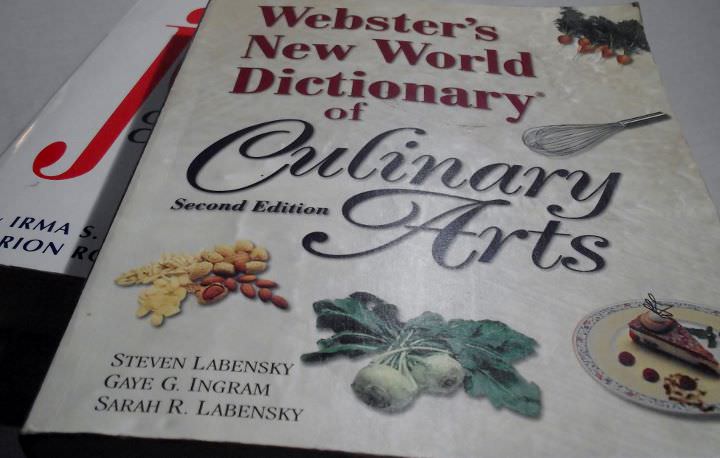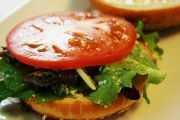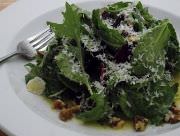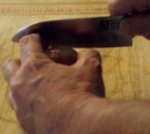Cooking Definitions And Terms
 Cooking definitions and terms because no one ever gets tired of vocabulary and grammar.
Cooking definitions and terms because no one ever gets tired of vocabulary and grammar.Cooking terms is one of the necessary evils that goes along with cooking.
It has always seemed to me that one of the hurdles with learning anything new is learning the vocabulary that goes along with that something new. Cooking is no different. Having a good cooking vocabulary will help you when you're reading recipes.
Cooking Terms And Cooking Definitions
A - C | D - F | G - I | J - O | P - R | S | T - Z
al dente
An Italian phrase meaning "to the tooth," used to describe
pasta or other food that is cooked only until it offers a slight
resistance when bitten into, but which is not soft or overdone.
bake
To cook food in an oven, dry heat cooking method.
barbecue
A method of cooking by which meat, poultry or fish (either whole or in pieces) or other food is covered and slowly cooked in a pit or on a spit, using hot coals or hardwood as a heat source. The food is basted, usually with a highly seasoned sauce, to keep it moist.
baste
To spoon or brush food as it cooks with melted butter or other fat, meat drippings or liquid such as stock. In addition to adding flavor and color, basting helps keep meats and other foods from drying out. Fatty roasts, when cooked fat side up, do not need basting.
blanch
To plunge food (usually vegetables and fruits) into boiling water briefly, then into cold water to stop the cooking process.
A horticultural technique whereby the leaves of plants are whitened or prevented from becoming green by growing them in complete darkness. It's this labor-intensive process that makes Belgian endive so expensive.
boil
"Bring to a boil" refers to heating a liquid until bubbles break
the surface (212°F for water at sea level). The term also means to cook
food in a boiling liquid. A "full rolling boil" is one that cannot be
dissipated by stirring.
braise
A cooking method by which food (usually meat or vegetables) is first browned in fat, then cooked, tightly covered, in a small amount of liquid at low heat for a lengthy period of time. The long, slow cooking develops flavor and tenderizes foods by gently breaking down their fibers. Braising can be done on top of the range or in the oven. A tight-fitting lid is very important to prevent the liquid from evaporating.
broil
To cook directly under a heat source.
caramelize
To heat sugar between 320 and 350 degrees. Caramelization
is the browning of sugar, a process used extensively in cooking for the
resulting nutty flavor and brown color. As the process occurs, volatile
chemicals are released, producing the characteristic caramel flavor.
Note that the preparation of many "caramelized" foods also involves the
Maillard reaction; particularly recipes involving protein and/or amino
acid -rich ingredients. See Maillard reaction.
chiffonade
To cut into thin strips, see knife cuts.
chop
To cut into bite sized pieces, see knife cuts.
coat
To cover food with an outer coating before cooking, typically food is coated in flour, then dipped in egg, and finally rolled in breadcrumbs. Also referred to as breading.
core
To remove the core from vegetables or fruit.
crisp tender
To cook until food is done but still retains some crispness.
dash
To add a drop or two of liquid or a pinch of spice.
deep-fry
To fry food completely submerged in fat.
deglaze
After food (usually meat) has been sauteed and the food and excess fat removed from the pan, deglazing is done by heating a small amount of liquid in the pan and stirring to loosen browned bits of food on the bottom. The liquid used is most often wine or stock. The resultant mixture often becomes a base for a sauce to accompany the food cooked in the pan.
dice
To cut food into small cubes, see knife cuts.
fine dice
To cut food into very small cubes, see knife cuts.
flake
To separate food with a fork, usually fish or braised meat.
garnish
A decorative edible accompaniment to a finished plate.
gastrique
French for "gastric," referring culinarily to a syrupy reduction of caramelized sugar and an acid, like vinegar or citrus juice, sometimes with the addition of wine.
grease
To apply a thin layer of fat to a baking pan.
grease and flour
To apply a thin layer of fat to a baking pan and coat it with flour, typically for cakes.
grill
To prepare food on a grill over hot coals or other heat source. The term barbecue is often used as a synonym for grill. See also Hand Test for Grilling Temperatures.
hull
To remove the outer covering or the leafy portion at the top, in the case of strawberries.
husk
To remove the outer covering, as with corn.
julienne
To cut food into very thin strips, see knife cuts.
knead
A technique used to mix and work a dough in order to form it into a cohesive, pliable mass. During kneading, the network of gluten strands stretches and expands, thereby enabling a dough to hold in the gas bubbles formed by a leavener which allows it to rise.
Maillard reaction
The Maillard reaction is a chemical reaction between
amino acids and reducing sugars that gives browned foods their
desirable flavor.
macerate
To soak a food (usually fruit) in a liquid in order to infuse it with the liquid's flavor.
marinate
To soak a food such as meat, fish or vegetables in a seasoned liquid mixture called a marinade.
mince
To cut food into very tiny pieces, see knife cuts.
mise en place
To prepare, to have everything ready before you begin cooking.
poach
To cook food gently in liquid just below the boiling point when the liquid's surface is beginning to show some quivering movement.
puree
To grind or mash food until it's completely smooth. This can be accomplished by one of several methods including using a food processor or blender or by forcing the food through a strainer or food mill.
reduce
Culinarily, to boil a liquid (usually stock, wine or a sauce mixture) rapidly until the volume is reduced by evaporation, thereby thickening the consistency and intensifying the flavor. Such a mixture is sometimes referred to as a reduction.
roast
To oven-cook food (from meats to vegetables) in a shallow uncovered pan.
rough chop
To cut food into random sized pieces, see knife cuts.
saute
To cook food quickly in a small amount of oil or other fat in a skillet or saute pan over direct heat.
scald
A cooking technique—often used to retard the souring of milk—whereby a liquid is heated to just below the boiling point.
score
To make shallow cuts (usually in a diamond pattern) in the surface of certain foods, such as meat or fish.
sear
To brown proteins quickly by subjecting it to very high heat in a skillet.
season
To flavor foods in order to improve their taste, principally using salt.
simmer
To cook food gently in liquid at a temperature (about 185°F) low enough that tiny bubbles just begin to break the surface.
skim
To remove the top layer from a liquid, such as cream from milk or foam and fat from stock, soups, sauces, etc.
soft peak
To whip egg whites until the whites form a point that rolls over when you remove the beater.
steam
Cooking method whereby food is placed on a rack or in a special
steamer basket over boiling or simmering water in a covered pan.
stew
A method of cooking by which food is barely covered with liquid and simmered slowly for a long period of time.
stiff peak
To whip egg whites until the whites form a point that stays firm when you remove the beater.
stir-fry
To quickly fry small pieces of food in a large pan over very high heat while constantly and briskly stirring the food.
whip
To beat ingredients, such as egg whites, cream, etc., thereby incorporating air into them and increasing their volume until they are light and fluffy.
zest
The perfumy outermost skin layer of citrus fruit (usually oranges or
lemons), which is removed with the aid of a citrus zester, paring knife
or vegetable peeler. Only the colored portion of the skin (and not the
white pith) is considered the zest.
Restaurant Lingo
- 2 minutes
- The length of time that any thing takes.
- Anthony how long on that mid-well steak? Two minutes, chef.
- 411
- Information
- Thanks for the 411 on tonight's special.
- 86
- To be out of something
- We had to 86 the salmon because we ran out mid-shift.
- All day
- The total number - If table 5 orders 3 burgers and table 2 orders 2 burgers that would be 5 burgers all day.
- How many burgers, all day? 5 all day.
- Bitch
- Everyone in the kitchen, except the chef.
- Where did the pantry bitch put those artichokes.
- In a minute
- An extremely long time.
- Hey, have you seen my microplane? Not in a minute.
- Back of the house
- The back end of the restaurant, principally, the kitchen, prep, and storage areas.
- I love working in the back of the house.
- Buried - See, “In the weeds”
- To be behind.
- How we doing? Buried chef.
- Campers
- Customers that want to hang out at a table all night.
- We got campers on table 7.
- Can’t cook his way out of a paper bag
- Someone who can’t cook well.
- The new sous, can't cook his way out of a paper bag.
- Cover
- A customer
- It was slow tonight, We only did 50 covers.
- Cremate
- Extra well done.
- Table 7 wants their burger cremated.
- Deuce
- A table for two, or, two people in a party.
- Seat this deuce on Table 10.
- Double
- Working two shifts in a row.
- I need a beer, I just pulled a double.
- Double sat or triple sat
- When more than one table is seated at the same time.
- We just got triple sat.
- Dupe
- The ticket that gets submitted to the kitchen.
- Where's the dupe for table 9?
- Drop
- To start cooking something.
- The chicken is almost done, better drop the fries.
- Dying
- Food that is sitting in the window waiting on a component of the plate.
- Mussels dying in the window.
- Early Birds - See, Blue hairs
- Generally elderly people or tourists who want everything included for one small price.
- We have a 3 top of early birds.
- Early bird specials
- A cheap meal that is available for a limited amount of time when the restaurant opens for service.
- We have 3 early bird specials.
- Fire
- An order given by the chef or expo to the line cooks to begin preparation of a specific dish.
- Fire those pot pies.
- Fired himself - Any one that leaves in the middle of their shift, usually without a word.
- Where's Steve? He fired himself chef.
- Foodie
- The bane of cooks and chefs everywhere, a wanna-be chef with an iPhone and a Yelp account.
- We have a foodie on table 4.
- Front of the house
- The front half of the restaurant, usually the dining room and bar.
- Who's the new guy? He's front of the house.
- Hockey puck
- A well done burger.
- Is that hockey puck ready?
- In the shits - See, "in the weeds"
- In the Weeds
- To be behind during prep or service.
- How you doing? In the weeds chef.
- Kill
- To intentionally overcook something.
- Kill that sirloin.
- Meez
- Short for mise en place.
- Hey dude, did you steal my meez.
- No call no show
- Employee who does not show up and does not call.
- Where's paul? He's a no call no show.
- Nuke
- To Microwave sonething.
- Nuke that burger.
- Office
- The walk-in refrigerator.
- Where's chef? In the office.
- On the Fly
- Something needed yesterday.
- I need those salads on the fly.
- Pump it out
- Getting food out quickly.
- Pump out that steak frites.
- Sacked
- Fired.
- We sacked the new guy, he couldn't cook his way out of a paper bag.
- Sell it
- To put a completed plate in the window.
- Is that Nicoise ready? Then sell it.
- Skate
- Leaving without doing sidework.
- Dave skated again.
- Slammed See, "In the weeds"
- Busy.
- How's saute doing? Slammed chef.
- Stiff
- To leave without tipping.
- A customer that doesn't tip their server.
- Still Mooing
- Ultra rare.
- They want their NY still Mooing.
- Stretch
- To make a small amount of something last through the remainder of the shift by adding whatever is available.
- Stretch that veloute with a little stock.
- Turn
- The number of parties at a table over the course of the night.
- We turned the entire restaurant 3 times tonight
- Top
- The number of people at a table.
- Table 4 is an eight top.
- Turn & Burn
- Turn a table quickly.
- Turn and burn table 3. We have a party waiting.
- Two second rule
- Length of time between when a piece of food hits the floor and when it’s picked up and placed in a pan or on a plate.
- Did you just pick that up off the floor? Two second rule, chef.
- VIP
- A very important customer
- Table 13 is a VIP.
- Walked
- A customer that left without paying.
- Table 12 walked.
- Window
- A shelf, usually with an overhead heat lamp where food is placed for pickup
- Where's my benedict for table 3? In the window.
Tags: cooking definitions, cooking term, cooking vocabulary




